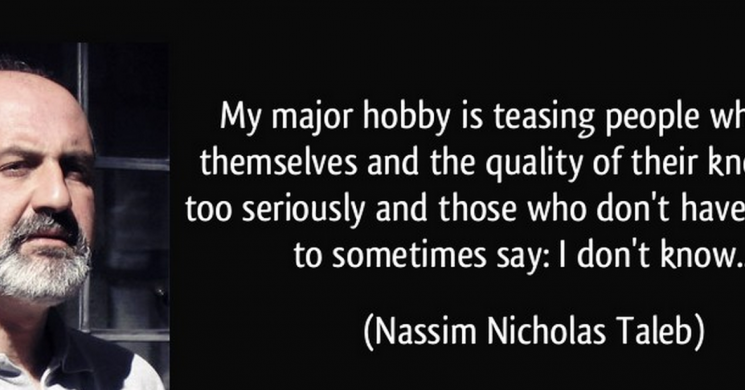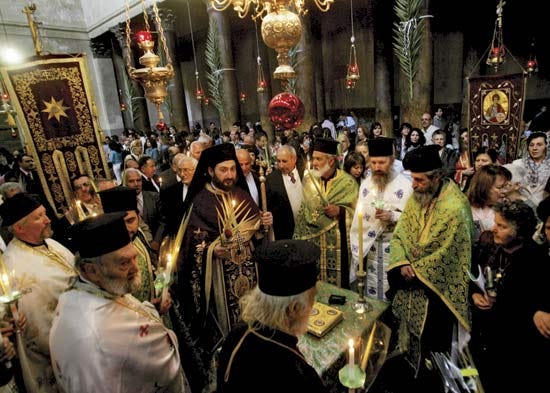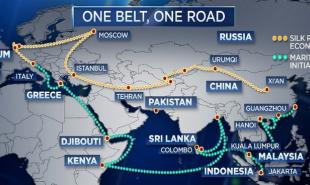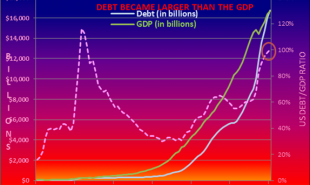
Introduction
To those of you who know Of Nassim Taleb's work in mathematics from his more famous works like Black Swan, and Fooled by Randomness this article may seem out of his domain. But it is not. Like many great minds, he attempts to apply his disciplined approach to different areas of knowledge.
And practically speaking, he is from Lebanon, which was once a thriving multicultural and cosmopolitan center for business. He witnessed the destruction of that center. So to us, this is a logical application of his expertise. A man trying to make sense of the senselessness in religious prejudices, using his considerable skillset. As a one time philosophy/theology major and religious convert interested in the divisions between religion and culture, this is a good read. This whole piece seems to be an intro to something more consequential about certain Islamic sects and the well meaning westerners who are enabling their own demise. Enjoy- Soren K.
A definition of Salafi as commonly understood is in order first.
Salafis are fundamentalists who believe in a return to the original ways of Islam. The word 'Salafi' comes from the Arabic phrase, 'as-salaf as-saliheen', which refers to the first three generations of Muslims (starting with the Companions of the Prophet), otherwise known as the Pious Predecessors.
And the main thrust of Taleb's point addresses this misconception
FTA:The problem with the European Union is that the naive I.Y.I. (intellectuals yet idiots) bureaucrats and representatives of the talking “elites” (these fools who can’t find a coconut on Coconut island) are fooled by the label. They treat Salafism as just a religion –with its houses of “worship” — when in fact it is just an intolerant political system, which promotes (or allows) violence and refuses the institutions of the West –those that allow them to operate. -NNTaleb
We Don’t Know What We Are Talking About When We talk about Religion
No, Salafism is not a religion — Fooled by the label — IYIs should bathe in Saudi Arabia
BackgroundThe problem of the verbalistic (and the journalistic) is expressed in an aphorism in the Incerto: mathematicians think in (well precisely defined and mapped) objects, philosophers in concepts, jurists in constructs, logicians in operators (…), and fools in words. Two people can be using the same word, meaning different things, yet continue the conversation, which is fine for coffee, but not when making decisions, particularly policy decisions affecting others. But it is easy to trip them, as Socrates did, simply by asking them what they mean by what they said –hence philosophy was born as rigor in discourse and disentanglement of mixed up notions, in precise opposition to the sophist’s promotion of rhetoric. Since Socrates we have had a long tradition of mathematical science and contract law driven by precision in mapping terms. But we also have had many pronouncements by idiots using labels.

People rarely mean the same thing when they say “religion”, nor do they realize that they don’t mean the same thing. For early Jews and Muslims, religion was law. Din means law in Hebrew and religion in Arabic. For early Jews, religion was also tribal; for early Muslims, it was universal[i]. For the Romans, religion was social events, rituals, and festivals –the word religio was a counter to superstitio, and while present in the Roman zeitgeist had no equivalent concept in the Greek-Byzantine East[ii]. Law was procedurally and mechanically its own thing, and early Christianity, thanks to Saint Augustine, stayed relatively away from the law, and, later, remembering its foundations, had an uneasy relation with it. For instance, even during the Inquisition, a lay court handled the sentencing.
The difference is marked in that Christian Aramaic uses a different word: din for religion and nomous (from the Greek) for law. Jesus, with his imperative “give to Caesar what belongs to Caesar”, separated the holy and the profane: Christianity was for another domain, “the kingdom to come”, only merged with this one in the eschaton. Neither Islam nor Judaism have a marked separation between holy and profane. And of course Christianity moved away from the solely-spiritual domain to embrace the ceremonial and ritualistic, integrating much of the pagan rites of the Levant and Asia Minor.
For Jews today, religion became ethnocultural, without the law — and for many, a nation. Same for Syriacs, Chaldeans, Armenians, Copts, and Maronites. For Orthodox and Catholic Christians religion is aesthetics, pomp and rituals, plus or minus some beliefs, often decorative. For most Protestants, religion is belief with neither aesthetics, pomp nor law. Further East, for Buddhists, Shintoists and Hindus, religion is practical and spiritual philosophy, with a code of ethics (and for some, cosmogony). So when Hindu talk about the Hindu “religion” they don’t mean the same thing to a Pakistani as it would to a Hindu, and certainly something different for a Persian.
When the nation-state idea came about, things got much, much more complicated. When an Arab now says “Jew” he largely means something about a creed; to Arabs, a converted Jew is no longer a Jew. But for a Jew, a Jew is someone whose mother is a Jew. (This has not always been the case: Jews were quite proselytic during the early Roman empire). But Judaism, thanks to modernism, somewhat merged into nation-state, and now can also mean a nation.
In Serbia-Croatia and Lebanon, religion means something at times of peace, and something quite different at times of war.
When someone discusses the interests of the “Christian minority” in the Levant, it doesn’t mean (as Arabs tend to think) promoting a Christian theocracy (as I said earlier, the church has always been uneasy in its relationship with the profane; full theocracies were very few in Christian history, just Byzantium, a short attempt by Calvin and few other episodes). He just means “secular” or wants a marked separation of church and state. Same for the gnostics (Druids, Druze, Mandeans, Alawis).
No, for Baal’s sake, stop call Salafism a “Religion”
The problem with the European Union is that the naive I.Y.I. (intellectuals yet idiots) bureaucrats and representatives of the talking “elites” (these fools who can’t find a coconut on Coconut island) are fooled by the label. They treat Salafism as just a religion –with its houses of “worship” — when in fact it is just an intolerant political system, which promotes (or allows) violence and refuses the institutions of the West –those that allow them to operate. Unlike Shiite Islam and Ottoman Sunnis, Salafis refuse to accept the very notion of minorities: infidels pollute their landscape. As we saw with the minority rule, the intolerant will run over the tolerant; cancer requires being stopped before it becomes metastatic.
IYIs, being naive and label driven, would have a different attitude towards Salafis if theirs was labelled as a political movement, similar to Nazism, with their dress code an expression of such beliefs. Banning burkinis may become palatable for them if it were made similar to banning swastikas: these people you are defending, young IYI, will deprive you of all the rights you are giving them, should they ascend to power and would force your spouse to wear a burkini.
We will see in the next chapter that “belief” can be epistemic, or simply procedural (pisteic) –leading to confusions about what sort of beliefs, are religious beliefs and which ones are not, disentangled through signaling. For, on top of the “religion” problem, there is a problem with belief. Some beliefs are largely decorative, some are functional (they help in survival); others are literal. And to revert to our metastatic Salafi problem: when one of these fundamentalists talks to a Christian, he is convinced that the Christian is literal, while the Christian is convinced that the Salafi has the same oft-metaphorical concepts to be taken seriously but not literally –and, often, not very seriously. Religions, such as Christianity, Judaism, and Shiite Islam, evolved (or let their members evolve in developing a sophisticated society) precisely by moving away from the literal –for, in addition to the functional aspect of the metaphorical, the literal doesn’t leave any room for adaptation .
Islam, ironically, has not always been purely law. The Ottoman Empire managed to do a separation between Islam as law and the state as Qanun, with a body of laws imported from the Byzantines. So did the Umayads relying on Christian diwan (the subjects in the educated class were Greek-speaking Syrians), importing notions from Roman law, particularly those concerned with commercial matters.
— — — — —
[i] Ibn Tamiyya
“As for the previous nations, none of them enjoined all people with all that is right, nor did they prohibit all that is wrong to all people. Furthermore, they did not make jihad (struggle) in this cause. Some of them did not take up armed struggle at all, and those who did, such as the Jews, their struggle was generally for the purpose of driving their enemy from their land, or as any oppressed people struggles against their oppressor, and not for sake of calling the people of the world to guidance and right, nor to enjoin on them right and to prohibit to them wrong.”
[ii] Robin Lane Fox.
Read more by Soren K.Group







